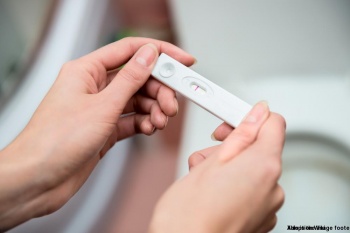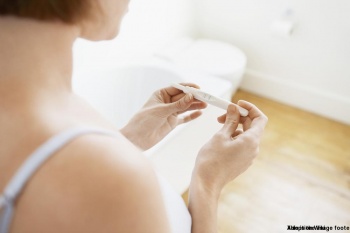Pregnancy Test
How Does a Pregnancy Test Work?
Even the most uncomplicated pregnancy will involve a number of tests, from the initial pregnancy test to screenings for disease to others that mean little to you, but a great deal to your medical practitioner.
Every pregnancy test, whether urine or blood, works by detecting the presence of human Chorionic Gonadotropin (hCG). If done correctly, a home pregnancy test will be almost as accurate as one done in a lab or doctor's office, but with more privacy and a lot less waiting. They are easy to use and relatively inexpensive. The sooner you know you're pregnant, the sooner you can start taking the best possible care of yourself and your baby. However if done too soon or incorrectly, you could get a false negative result which might cause you to postpone seeing your medical practitioner and taking care of yourself. Even a positive answer can be a problem if you assume that there's no need to see the doctor now that you have the answer. Home tests are a great first step but should never replace a visit to your practitioner.
A pregnancy test done in a lab or doctor's office will usually use urine. Some practitioners prefer blood tests, which are more accurate and can help date the pregnancy by measuring the exact amount of hCG in the blood (important if you have irregular periods of if an ectopic pregnancy is suspected). A blood test can detect hCG earlier than a urine test, about a week after conception. Lab and office tests aren't as convenient as those done in the home, but their increased accuracy can give you faith in the results.
Your blood will be tested for type (A, B, AB, or O) and antibody (Rh negative or Rh positive). If your blood is Rh negative and your baby's blood is positive, your pregnancy will require some special care. Another blood pregnancy test will check for anemia, while others will check for syphilis, HIV, hepatitis B, and whether or not you are immune to rubella.
You may have another pregnancy test about four months into your pregnancy to check for alpha-fetoprotein (AFP), which can signal a risk of neural tube defects (spina bifida) or Down Syndrome. Other tests you may have include amniocentesis, chorionic villus sampling (CVS), and genetic testing - all designed to catch a possible problem early, offering time to prepare and possibly begin treatment while still pregnant.
Home Pregnancy Tests
When you think that you could possibly be pregnant, you should head to the drug store and find a home pregnancy test that you can take. One of the best reasons to take a home pregnancy test is that you will be able to get a quick answer without having to go to your doctor. This way, you can take the pregnancy test within the privacy of your own home.
Basically, how the home pregnancy test works is by detecting the level of hGC, or the pregnancy hormone, that is present within your body. You take the test by sampling the levels within your urine. Many of the home pregnancy tests that you will find on the market all work the same way, however most of them will differ in their detection ability.
If you are looking to buy one of the early response home pregnancy test kits, you can usually find out if you are pregnant much sooner than you would with one of the other test kits. These early response kits are made to be able to detect the pregnancy hormone up to three days before your period is even due. If you take one of these tests and you get a negative result, you can always get another one and test again within a week to see if you get a different result.
Many of the home pregnancy tests are pretty similar when it comes to the collection of urine. Usually, you can either urinate directly onto the test strip or you can gather the urine in a cup first. This is basically preference, and using one method or another will have no bearing whatsoever on the results of the test. Just make sure that you are careful to read the directions carefully and whichever home pregnancy test you choose should give you the accurate results that you desire.
EPT Pregnancy Test
When you think that you may be pregnant, one of the most popular tests that people reach for to get results would have to be the EPT Pregnancy Test. Studies have shown that this test is actually 99% accurate when it comes to detecting the early signs of a pregnancy. Becoming pregnant is a big step in your life, so you want to be sure that you are taking a test that can give you the best results possible. Ease of use is another important factor. The last thing that you want to do is fumble around with a test or perhaps not get an accurate reading because you did not fully understand how to use it.
With the EPT Pregnancy Test, the process is fairly simple to complete. You basically have a test stick with a thumb grip on one end, absorbent tip on the opposite end, and two windows in the middle with one being round and the other being square. To start the process, you take the test stick and place the absorbent tip in your urine stream for 5 seconds or so until it is fully saturated. Then, you place the EPT Pregnancy Test stick on a totally flat surface face up so that it can begin to work.
The test usually takes only a few minutes before you can get a reading and figuring out the results are really simple. If there is a line in each of the windows, you are pregnant. If you only see one line, then you are not pregnant. Be sure that you can get a good look at both of the windows, because even if there is a faint second line, you are more than likely pregnant.
If your test is negative, but you still do not start your next menstrual cycle on time, it may be best to take another EPT Pregnancy Test just to be sure.
Online Pregnancy Tests
If you think you might be pregnant, but aren't sure if you need to go out and spend the money on a home pregnancy test, you can visit any one of a number of Web sites that offer an online pregnancy test.
Unlike a home urine test, an online pregnancy test can't give you a definite yes or no answer. It can tell you if there's a chance you're pregnant, basing the answer on your replies to questions in the test.
Your answer will be expressed as a percent - for example, "Based on one occurrence of unprotected sex on the day you entered, there is a 15% chance of pregnancy." The online pregnancy test will never give you a higher chance than the statistical probability - that is, it will never say there is a 90 percent or 100 percent chance of pregnancy. The statistical chance of becoming pregnant in any one month, even with unprotected sex at the most fertile time, is only about 25 percent, so you will never receive an answer much higher than that figure.
An online pregnancy test is easy and takes only a few minutes to complete. You will be asked to supply facts such as your age, the average time between your periods, and the first day of your last normal period. (Some test sites supply calendars to help you pinpoint precise dates.) You will also be asked what date you think you got pregnant, and whether or not you had intercourse on other days around that time.
Some tests will then go on to ask you about symptoms you might be experiencing, such as fatigue, nausea or vomiting, and swollen, tender breasts. You might also be asked what kind of birth control you were using at the time. Once you've filled in all the dates, simply press the button and wait for the results of your online pregnancy test.
Most sites point out that an online pregnancy test is not a diagnosis and should not be considered medical advice. No matter what the statistical probability that you are pregnant, most sites will tell you that if you suspect pregnancy, you should call your doctor and have a blood or urine test done.
Return to Pregnancy page


